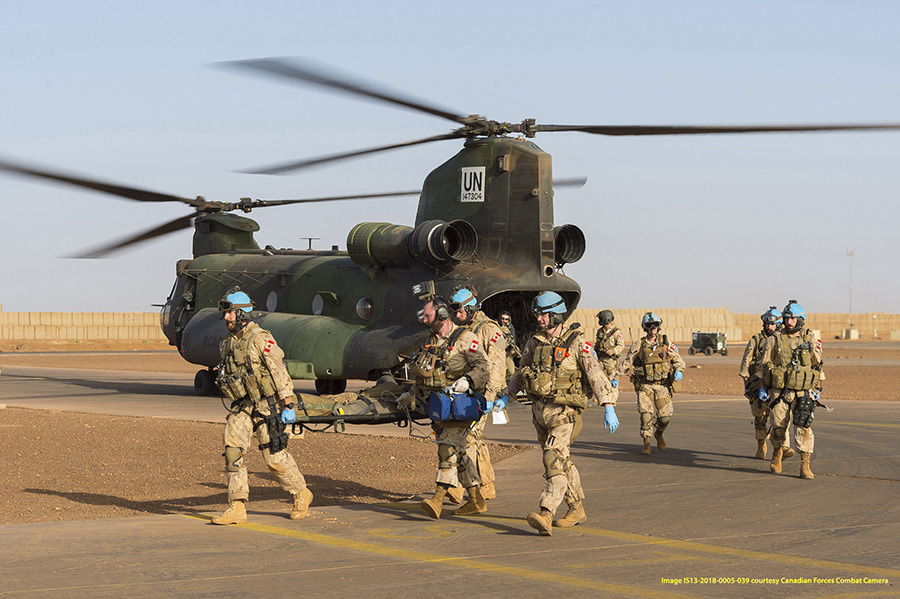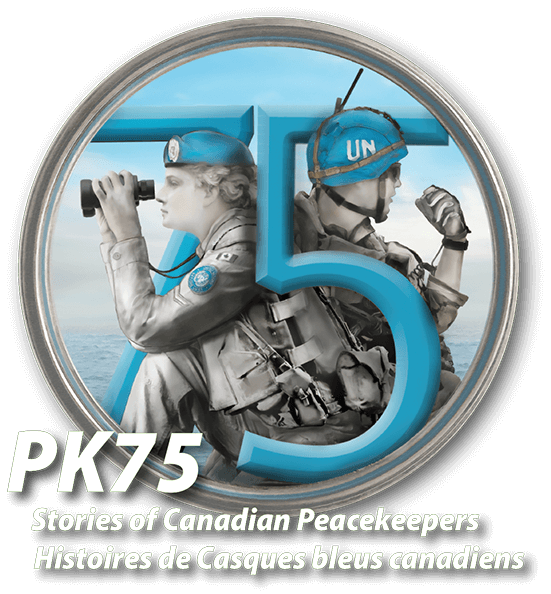
The International Association of Peacekeeping Training Centres
INTRODUCTION
The International Association of Peacekeeping Training Centers (IAPTC) is a worldwide organization that meets once a year in a different host country. Today it is highly valued by the UN and by many participating countries and organizations. Membership is open to any institution involved in the education and training of military, police, or a wide range of civilians, in order to prepare them for peace or stability operations. It is also open to individuals with an official interest or involvement in such operations. The Association is a voluntary and informal organization with no membership costs — participants in the annual conference pay their own expenses each year.
The IAPTC is a Canadian initiative. In 1995 the founding President of Canada’s Pearson Peacekeeping Centre (PPC) developed an idea to bring together a number of peacekeeping training centers and share expertise and, potentially, programs and instructors. PPC at the time already held a wider understanding of peacekeeping — a so-called ‘peacekeeping umbrella’. This umbrella concept meant that peacekeeping was far more than traditional missions and included, in parallel with security aspects, humanitarian, development, refugee, law and order, and other matters contributing to stability and peace in a country/region. As such it involved police, other law and order officials, and a very diverse range of civilian organizations and officials, in addition to the traditional military.
The first annual gathering of volunteer Centres from around the world took place in Cornwallis, NS in July 1995 and included 22 officials from 14 countries. Canada was represented by the PPC president and senior military and civilian staff, as well as the RCMP. In early 1995, the PPC President tried in vain to interest the UN in participating and contributing to such a conference. In order to gain some international interest, recognition, and credibility, he approached me while I was still a member of NATO’s international staff. He asked me to bring NATO’s training concept to the Cornwallis meeting, as well as the training aspects of NATO’s relatively new "Partnership-for-Peace Program" (PfP). I was able to do so, in part as an opportunity to promote PfP, but also to present a NATO understanding of new training challenges based on early experiences in Bosnia.
The annual conference now attracts more than 200 participants from some 50 plus countries and over 100 organizations. Its primary objectives are education and training for peace operations, and the sharing of personal experiences (rather than government policies). Through planned and informal discussions amongst participants, a further objective is for people from the various contributing functions to better understand each other’s roles, concepts, characteristics, timelines, strengths, and limitations.
EARLY CHALLENGES AND DEVELOPMENT
Development of the IAPTC has gone through a number of phases, starting with challenges to stay alive in the late nineties. Following annual conferences hosted in 1996–1998 in Italy, Malta and Norway, there was no volunteer host for 1999, so PPC hosted again. South Africa and Japan hosted in 2000 and 2001, but participation remained low — below 75 attendees. During these first seven years, PPC managed the programs through the President and a one-person Secretariat. I became that Secretariat in late 2000 and continued through to 2004. The annual conferences in Argentina in 2002 and in Germany in 2003, saw a steady rise in participation, to over 100 at a police academy in Germany. It was also established that an organization hosting the annual conference would assume the role of Association Presidency the following year and engage in the detailed planning of the annual conference program.
By accident more than design, initially it was realized that the hosting between 2000 and 2004 actually changed continents — Africa, Asia, Americas, then Europe. Thus, starting in Ghana in 2005, it was decided to make that a hosting policy, in the main to make it easier (and less costly) for more local Centres and officials to participate. Over the period 2005 until 2019, it became an honour to host and countries/organizations competed for the privilege. The years 2020 and 2021 had only virtual conferences due to the Covid pandemic, but in 2022 Bangladesh, for the third time, offered to host. Past hosts have included the aforementioned Canada (twice), Italy, Norway, Japan, Bangladesh (3 times), Germany and Argentina, as well as India, Chile, Sweden, Nigeria, Australia, USA, Finland, Indonesia, Brazil, Bosnia, Egypt, New Zealand and Peru. In 2023, the host will be Kenya.
The actual annual conference is not a traditional subject-oriented meeting of experts. Rather it seeks to create dialogue amongst the participants through short presentations and discussions with experts, small multi-functional group discussions, as well as lunch and dinner, and post-dinner discussions and exchanges. The program platform has a broad theme related to peacekeeping education and training. In the early days, participants used to simply exchange paper copies of their institution's programs but, because of a combined Canadian initiative (an RCMP Superintendent and I), we made a half-day available in the program for all participants to share their programs, pedagogical concepts, training technologies, and other information in a large separate or adjoining location.
MANAGEMENT OF THE ASSOCIATION
Today, the affairs of the IAPTC are managed by an Executive Committee comprising some 11 individuals: the President (past host), the Host, the past Presidency, the Host designate, the Secretariat, four expert functional chairs (military, police, civilian and pedagogical), the UN, the Chair of the Consolidation and Development group, and a senior advisor (honorary member — Lightburn). The four-person Presidency group normally provides for representation from the four regions, as do the four functional chairs. In addition to regional balance, the Committee strives for both gender and experience balance. It is important to note that each post and associated costs, with the exception of the senior advisor, are the responsibility of an organization and not any individual. My costs were all paid initially by PPC and, for 11 years (2005–2016), by Sweden. Canada declined to support and, for two years (2017–2018), I was unable to contribute. At one point, in 2015, I was actually asked to draft three or four paragraphs on Swedish support to IAPTC, including covering my costs to contribute each year, for the peacekeeping part of their proposal to be a Security Council member in 2017. In addition to Swedish recognition, I was also proud to be specially honored by Australia, in 2010, for 15 years of service to IAPTC and then again in Peru at the 25th conference for 25 years of service.
The key Secretariat role has, since 2017, been held by Egypt’s ‘Cairo International Center for Conflict Resolution, Peacekeeping and Peacebuilding’ (CCCPA). For the first ten years, the Secretariat was based in Canada’s PPC, and for the next eleven years by India’s Centre for UN Peacekeeping. Membership in the IAPTC is voluntary and comprises all participants in the current annual conference, plus those attending the past two conferences. The Secretariat maintains the membership list.
In 1999, PPC developed a set of policies for governing the IAPTC — the ‘Articles of Association’. These have been amended three times and remain open for adjustments by the membership during the annual conference, as required.
UN support for IAPTC has grown from zero, to providing a speaker or two, to associate membership on the Executive Committee, to full key membership. For UN officials, IAPTC is now ‘one-stop shopping’ and according to many “if it didn’t exist it would have to be created”.
STRENGTHENING THE IAPTC CONCEPT THROUGH REGIONAL ASSOCIATIONS
The networking opportunities and the valuable sharing of information in the field of education and training for peace operations in the IAPTC, that were so obvious and effective over the first six or seven years of its existence, led some ten institutions in Africa to build on their IAPTC success by generating even closer links in forming their own ‘chapter’ of the Association. In 2003/04 a regional chapter of the IAPTC was born — the African Peace Support Trainers Association, or APSTA. Today, APSTA has grown to 19 members and, like the IAPTC, has an annual conference.
In December 2007, seven countries in Latin America and the Caribbean also formed a regional chapter of the IAPTC, the Latin American Association of Peacekeeping Operations Training Centres ALCOPAZ, although different in nature from its African counterpart. ALCOPAZ now has nine centers, as well as observers from Canada, the USA, France, and Russia. Later, in 2010, following a most successful IAPTC in Australia, the Association of Asia-Pacific Peace Operations Training Centres, or AAPTC was founded. It has some 15 members. Finally, in 2013, I had the privilege of being asked by German police and military authorities to draft a concept for a European association of peace operations training centres (EAPTC). I was able to take the best characteristics of the IAPTC and the three existing regional associations and draft not only a concept, but also the objectives and a proposed set of Articles of Association. The EAPTC was born at the Federal Police Academy in Lubeck Germany in 2013.
Each of these regional groupings, while adopting some of the structure and concept of the IAPTC itself, is different in several ways. Some have a Presidency, some have Articles of Association, there are varying forms of a Secretariat, objectives have some commonalities but also differences, and the hosting and annual conferences also have dissimilarities.
The modest cooperation that began with some 14 countries (and NATO) in 1995, at a former military base on the shores of the Annapolis Basin in Nova Scotia, Canada, has now transformed so that today the cooperation in the important field of education and training for peace operations reaches all corners of the world.


